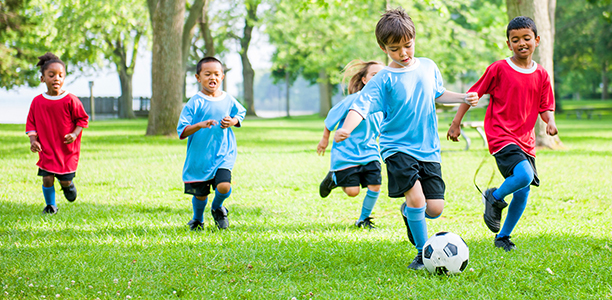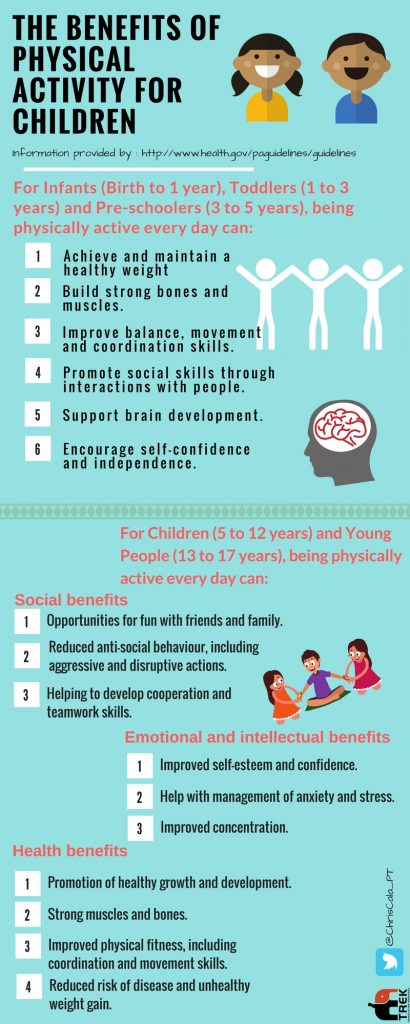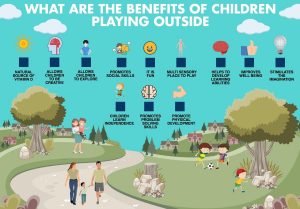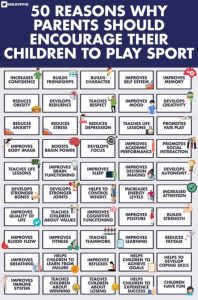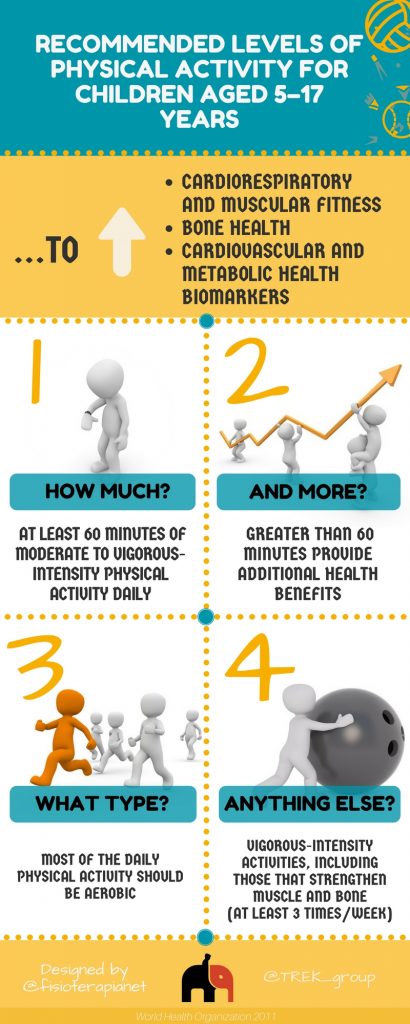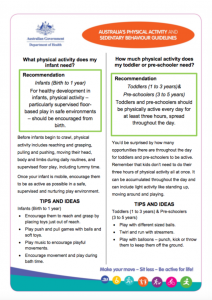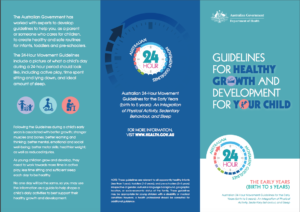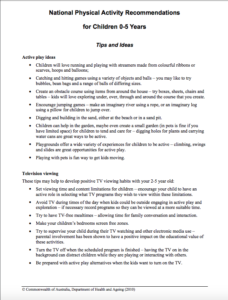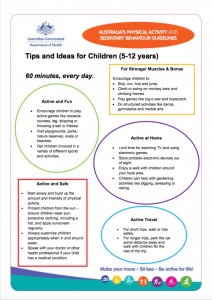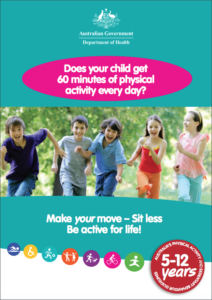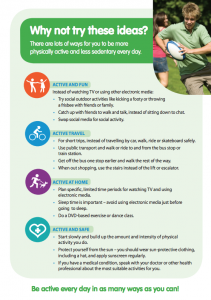“The “Global Recommendations on Physical Activity for Health” address three age groups: 5–17 years old, 18–64 years old and 65 years old and above. These age groups were selected taking into consideration the nature and availability of the scientific evidence relevant to the prevention of noncommunicable diseases through physical activity” (WHO)
The WHO (2010) recommendations for children can be found here.
This short video demonstrates the importance of exercise for children:
More information on promoting physical activity to children can be found at: http://designedtomove.org/
Information provided from health.gov.au
Physical Activity Recommendations – Have fun!
Note: Although meeting the physical activity recommendations, the Australian Government also provides recommendations on sedentary behaviour and sleep.
Infants physical activity recommendations (Birth to one year)
- interactive floor-based play in safe environments
- 30 minutes of tummy time with reaching and grasping, pushing and pulling, and crawling
- Encourage play by placing toys out of reach
- Encourage play during bath time
- Play with various balls and toys that promote active play & introduce family
- Introduce physical games i.e. hide & seek or follow the leader
- Pretend to be animals
Infants sedentary behaviour recommendations
- Should not be restrained for more than 1 hour at a time (e.g. in a stroller, car seat or high chair). \
- Should not spend any time watching television or using other electronic media (DVDs, computer and other electronic games) and instead, when sedentary, the caregiver is encouraged to engage with them through activities such as reading, singing, puzzles and storytelling.
Infants Sleep
During a 24hour period (including naps);
- 0-3months = 14 to 17 hours
- 4-11months = 12 to 16 hours
Toddlers physical activity recommendations (1 to 2 years)
- At least 180 minutes a day doing a variety of physical activities including energetic play such as running, jumping and twirling spread throughout the day
- Choose ‘active’ toys; choose toys and play materials that encourage movement and help develop skills like running, kicking, throwing and catching; when possible, involve all of the family; Being outdoors is best; Encourage children to be independent and to explore the world around them;
- Play with different sized balls.
- Twirl and run with streamers
- Play with balloons – punch, kick or throw them to keep them off the ground.
- Blow bubbles and chase them through the air.
- Play games – try hide-and-seek, obstacle courses, follow the leader, stuck in the mud, or tip/tag games.
- Move to music or try action songs
- Walk barefoot on different surfaces – try grass, carpet, concrete or sand.
- Pretend to move like different animals.
- Play dress ups and act out different roles.
- Walk to places rather than driving or using the stroller.
- Choose ‘active’ toys; choose toys and play materials that encourage movement and help develop skills like running, kicking, throwing and catching; when possible, involve all of the family; Being outdoors is best; Encourage children to be independent and to explore the world around them;
Toddlers sedentary behaviour recommendations
- Should not be restrained for more than 1 hour at a time (e.g. in a stroller, car seat or high chair) or sit for extended periods.
- For those toddlers younger than 2 years, screen time is not recommended during sedentary periods.
- For those aged 2 years, screen time should be no more than 1 hour in total throughout the 24-hour period- less is better.
- When toddlers are sedentary, the caregiver is encouraged to engage with them through activities such as reading, singing, puzzles and storytelling.
Toddlers Sleep
- 11-14hours of good quality sleep in a 24hour period
- AND consistent wake and sleep times
Pre-schoolers physical activity recommendations (3 to 5 years)
- At least 180 minutes a day in a variety of physical activities, of which 60 minutes is energetic play such as running, jumping and kicking and throwing, spread throughout the day
- Tips and ideas for 3-5years are similar to the aforementioned 1-2years
Pre-schoolers sedentary behaviour recommendations
- Should not be restrained for more than 1 hour at a time e.g. in a stroller or car seat) or sitting for extended periods.
- Sedentary screen time should be no more than 1 hour in total throughout the 24-hour period -less is better.
- When pre-schoolers are sedentary, caregivers are encouraged to engage with them through activities such as reading, singing, puzzles and storytelling.
Pre-schoolers Sleep
- 10-13hours of good quality sleep (may include a nap)
- AND consistent wake and sleep times
Tips and ideas for children (0-5 years)
Information provided from health.gov.au
Physical activity for children 5-12 years provides social benefits, emotional and intellectual benefits & health benefits. It should involve moving more and sitting less!
Remember, not all the physical activity needs to be completed all in one go. The 60 minutes can be accumulated throughout the day. However, it should be of moderate-vigorous intensity.
- Use obstacle courses
- Encourage skipping, hopping, running and climbing
- Walking, riding, skateboarding or scooting
- Visit playgrounds
- Encourage a large variety of sports/activities
- Walk instead of drive if possible
- Allow children to help with gardening or washing of the car
- Introduce games like tag or frisbee
Note: As with 0-5 years, the Australian Government also provides recommendations on sedentary behaviour and sleep.
Sedentary Behaviour:
- Limit use of electronic media for entertainment
- to no more than two hours a day (Less is better!)
- Break up long periods of sitting as often as possible.
More information on promoting physical activity to children can be found at: http://designedtomove.org/
Tips and ideas for children (5-12 years)
Information provided from health.gov.au
- Meet friends for walks
- Join a local group/team
- Find something you enjoy! I.e. dance, martial arts
- Kicking the football or throwing a frisbee
Note: As with 5-12 years, the Australian Government also provides recommendations on sedentary behaviour.
Sedentary Behaviour:
- Limit use of electronic media for entertainment
- to no more than two hours a day (Less is better!)
- Break up long periods of sitting as often as possible.
Tips and ideas for young people (13-17 years)
